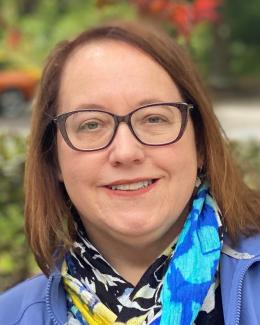CCSI scientist Jiafu Mao, of the Terrestrial Systems Modeling group in the Environmental Sciences Division, parlayed his interest in physics and mathematics as a student in China into a field of study he has always found interesting: how land and climate interact.
The researcher earned his BS in meteorology from the Nanjing University of Information Science and Technology in 2001. While he was working toward a combined MS and PhD in atmospheric sciences at the Chinese Academy of Sciences in Beijing, the field of climate science was surging.
During his graduate studies Jiafu began working on climate models that would inform his professional career. In 2002-03, he coupled an atmospheric-vegetation interaction model with a new generation grid-point atmosphere model. Later, he established another model designed to simulate the carbon and water cycle across China at different temporal scales.
After earning his degree in 2007, Jiafu worked as a postdoc at the University of New South Wales and the Commonwealth Scientific and Industrial Research Organization in Australia, continuing his modeling work around the atmosphere-biosphere interaction, specifically examining dynamic global vegetation models.
Jiafu began his work as a postdoc at ORNL in 2009, continuing to study regional and global responses of terrestrial ecosystem dynamics to natural and anthropogenic factors. As a staff scientist, he continues to work on new models, taking into account field measurements, satellite data, and other information to elevate our understanding of land-climate interactions and feedbacks.
“I’m always fascinated by the question of how land surfaces respond and feedback to climate change,” Jiafu said. “Answering this question requires understanding the biogeophysical and biogeochemical processes ranging from site, regional, to global scales.”
Various observational datasets support Jiafu’s research on modeling and mechanistic analysis at different scales. “Over the past few years, I’ve been involved in a number of projects to address this overarching question and better understand the underlying mechanisms,” he said.
His work primarily involves understanding hydrology, carbon cycling, and vegetation dynamics in the terrestrial ecosystems with process-oriented land surface and Earth system models; investigating the land surface response to multiple-factor global change and to attribute the variations of terrestrial dynamics to natural and anthropogenic drivers; and global scale coupling research primarily concentrating on land-climate interactions with the integrated earth system modeling framework.
Jiafu’s research has been published in leading journals including Nature Climate Change, Biogeosciences, Global Change Biology and Environmental Research Letters among others.
Jiafu has also been involved in mentoring students and postdocs both at ORNL and at the University of Tennessee, Knoxville, where he holds a joint faculty position. Away from the lab, Jiafu and his wife, who is also an ORNL researcher, enjoy time with their two young children.





